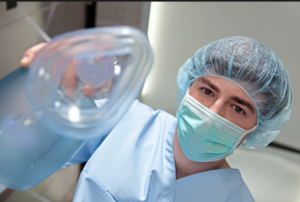It was just like a horror movie – he woke up from a routine surgery but couldn’t breathe… couldn’t move … couldn’t speak… and realized he was about to suffocate. Did my father live?
Luckily someone noticed the problem and got him re-ventilated. He woke up several hours later in the ICU, completely fine and grateful to be alive. What on earth happened?
The main clue was the anesthesia they used – succinylcholine. It’s a fast-acting paralytic used on patients who need to be intubated – frequently used in the OR and also the ER. The rest of the surgery was done under general anesthesia. Half an hour later when the surgery was over, they woke my dad up. But he couldn’t breathe because his body hadn’t fully metabolized the succinylcholine. Instead of 5 minutes, it took about 5 hours to wear off.
Pseudocholinesterase deficiency is totally asymptomatic – until it isn’t. It has no known endogenous physiological function, but it is responsible for metabolizing choline ester drugs.
A $99 kit from 23andMe revealed that my dad carries one copy of Asp70Gly mutation in the BCHE gene. That means the enzyme, which is a multimer, contains some good copies and some mutant copies of the monomer. The enzyme, which circulates in the plasma, usually inactivates most of the succinylcholine and only the remaining 5-10% gets to the neuromuscular junction to cause the paralysis. If the enzyme isn’t fully functional, more drug remains available for longer.
This particular variant was identified in 1989 [link to pdf]
It’s not like this is a rare variant, either. The minor allele frequency is somewhere in the range of 0.01 to 0.02 in European populations [refSNP][1000 Genomes] and even higher in Persian Jews and an Indian subpopulation. On top of that, Asp70Gly is only one of more than 50 known variants in the BCHE gene.
Guess what else is metabolized by BCHE? Cocaine. Pseudocholinesterase deficiency is linked to sudden cardiac death from cocaine. People with this variant could die the very first time they try it. (Interestingly, there’s an opposite variant of BCHE (A328Y) that metabolizes cocaine 4 times faster than normal.)
And then there’s novocaine. Also organophosphorus pesticides, which bind irreversibly. And Donezipil, used to slow Alzheimer’s, and pilocarpine, which is in some glaucoma and dry-mouth treatments.
This is a prime example of why the new field of pharmacogenomics is so important. My dad survived, but wouldn’t it be great if other people didn’t have to consciously experience their own death by suffocation? This variant would be flagged immediately in the patient’s medical record – and if they happen to need surgery, the anesthesiologists will know to adjust the dosage. Pediatricians could warn young teens never to try coke. Dentists and optometrists might need to know too. My dad now wears a medic-alert bracelet so if he ever ends up in the ER, they won’t use succinylcholine. The young anesthesiologist later confessed that my dad was the first case of “prolonged post-operative apnea” that he had seen. Let’s hope he handles the next one a little better.
There is a lower-tech solution, though. You could just drip the patient’s plasma on a piece of Acholest paper and get the answer within 20 minutes.
Use in treatment of ‘deviants’ at psychiatric hospital
Succinylcholine as a murder weapon

